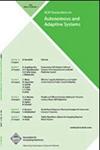Learning in Cooperative Multiagent Systems Using Cognitive and Machine Models
IF 2.2
4区 计算机科学
Q3 COMPUTER SCIENCE, ARTIFICIAL INTELLIGENCE
引用次数: 0
Abstract
Developing effective Multi-Agent Systems (MAS) is critical for many applications requiring collaboration and coordination with humans. Despite the rapid advance of Multi-Agent Deep Reinforcement Learning (MADRL) in cooperative MAS, one of the major challenges that remain is the simultaneous learning and interaction of independent agents in dynamic environments in the presence of stochastic rewards. State-of-the-art MADRL models struggle to perform well in Coordinated Multi-agent Object Transportation Problems (CMOTPs) wherein agents must coordinate with each other and learn from stochastic rewards. In contrast, humans often learn rapidly to adapt to nonstationary environments that require coordination among people. In this paper, motivated by the demonstrated ability of cognitive models based on Instance-Based Learning Theory (IBLT) to capture human decisions in many dynamic decision making tasks, we propose three variants of Multi-Agent IBL models (MAIBL). The idea of these MAIBL algorithms is to combine the cognitive mechanisms of IBLT and the techniques of MADRL models to deal with coordination MAS in stochastic environments from the perspective of independent learners. We demonstrate that the MAIBL models exhibit faster learning and achieve better coordination in a dynamic CMOTP task with various settings of stochastic rewards compared to current MADRL models. We discuss the benefits of integrating cognitive insights into MADRL models.基于认知和机器模型的协作多智能体系统学习
开发有效的多智能体系统(MAS)对于许多需要与人类协作和协调的应用程序至关重要。尽管多智能体深度强化学习(MADRL)在合作MAS中的发展迅速,但仍然存在的主要挑战之一是在随机奖励存在的动态环境中独立智能体的同时学习和交互。最先进的MADRL模型在协调多智能体物体运输问题(cmops)中表现不佳,其中智能体必须相互协调并从随机奖励中学习。相比之下,人类往往能迅速学会适应需要人与人之间协调的非固定环境。基于实例学习理论(Instance-Based Learning Theory, IBLT)的认知模型在许多动态决策任务中捕捉人类决策的能力,本文提出了多智能体IBL模型(Multi-Agent IBL models, MAIBL)的三种变体。这些MAIBL算法的思想是将IBLT的认知机制与MADRL模型技术相结合,从独立学习者的角度处理随机环境下的协调MAS。我们证明,与现有的MADRL模型相比,MAIBL模型在具有各种随机奖励设置的动态CMOTP任务中表现出更快的学习速度和更好的协调能力。我们讨论了将认知洞察力集成到MADRL模型中的好处。
本文章由计算机程序翻译,如有差异,请以英文原文为准。
求助全文
约1分钟内获得全文
求助全文
来源期刊

ACM Transactions on Autonomous and Adaptive Systems
工程技术-计算机:理论方法
CiteScore
4.80
自引率
7.40%
发文量
9
审稿时长
>12 weeks
期刊介绍:
TAAS addresses research on autonomous and adaptive systems being undertaken by an increasingly interdisciplinary research community -- and provides a common platform under which this work can be published and disseminated. TAAS encourages contributions aimed at supporting the understanding, development, and control of such systems and of their behaviors.
TAAS addresses research on autonomous and adaptive systems being undertaken by an increasingly interdisciplinary research community - and provides a common platform under which this work can be published and disseminated. TAAS encourages contributions aimed at supporting the understanding, development, and control of such systems and of their behaviors. Contributions are expected to be based on sound and innovative theoretical models, algorithms, engineering and programming techniques, infrastructures and systems, or technological and application experiences.
 求助内容:
求助内容: 应助结果提醒方式:
应助结果提醒方式:


